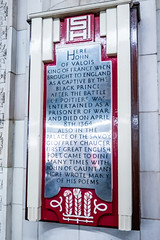Duke John of Gaunt
Commemorated on 2 plaques
In the Palace of the Savoy lived for many months Simon de Montfort, founder of the House of Commons. This also was the home of John of Gaunt, Duke of Lancaster, who lived here in princely luxury from 1362 to 1381
Savoy Court, London, United Kingdom where they lived
Here John of Valois King of France when brought to England as a captive by the Black Prince after the Battle of Poitiers, was entertained as a prisoner of war, and died on April 8th 1364. Also in the Palace of The Savoy, Geoffrey Chaucer first great English poet, came to dine many times with John of Gaunt, and here wrote many of his poems
Savoy Court, WC2R 0ET, London, United Kingdom where they came to dine



